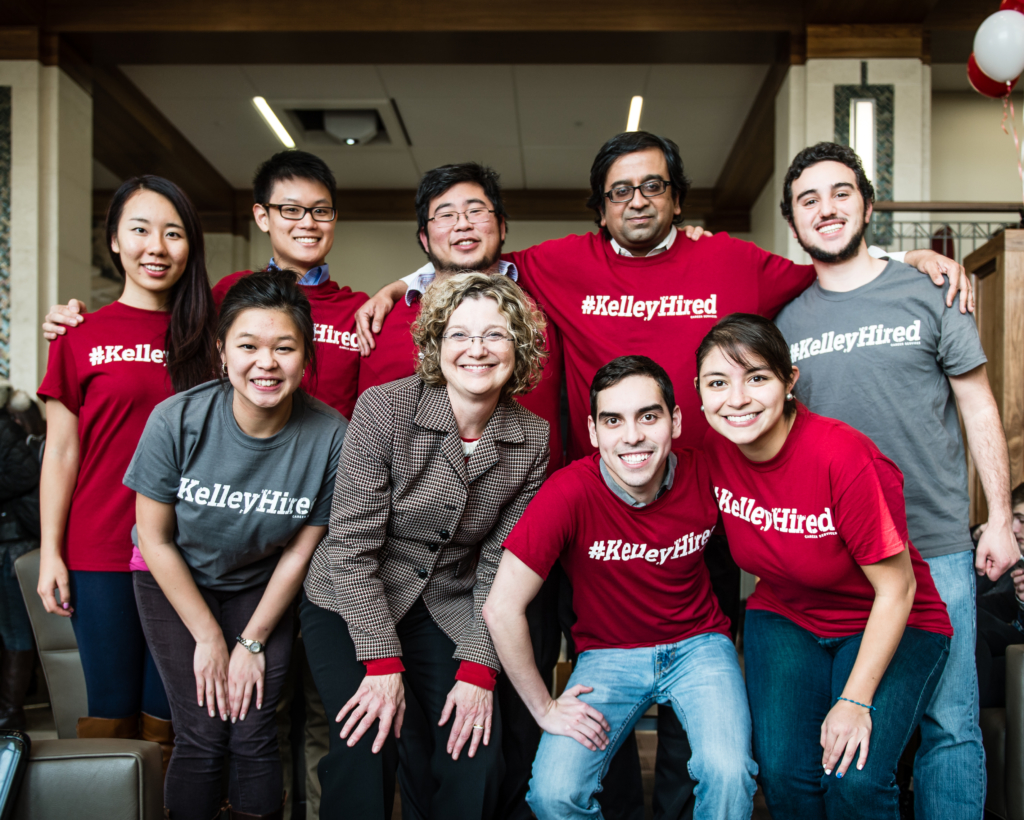
Indiana Kelley photo
Some people choose business, and for others, business chooses them. Idalene “Idie” Kesner, dean of Kelley School of Business at Indiana University, was born into it.
Growing up in Dallas, she says she has a “normal, standard family” where her father worked and her mom stayed home to take care of the home, her three older siblings, and her. But their home life was unique.
“My father was a stockbroker and my mother was very engaged in my father’s business and the stock market as well,” she says. “Every conversation at dinner was about what was happening in the stock market and in the business world that day. On Friday nights, we would watch a show about what happened in Wall Street markets that week.”
The youngest of four, Kesner says she cannot remember a time she wasn’t talking about business since her older brothers and sister were discussing business-related events probably before she could speak. Her oldest sibling is 10 years older than her.
And while her mother stayed home, she was not a traditional housewife. Kesner says she was probably a better stock picker than her father. Kesner’s mother often engaged in conversations on stocks with Kesner’s father and invested in tech companies like Apple early on. “She understood this would be the future, she had a sensitive touch for business climate,” Kesner recalls.
BECOMING INDIANA KELLEY’S FIRST WOMAN DEAN
By the time Kesner was in high school, she had been so exposed to business topics that she sensed it would be a piece of her for the rest of her life, though she wasn’t sure how. Kesner went on to pursue a degree in business administration at Southern Methodist University in Dallas, and then her MBA and Ph.D. at Indiana University before eventually becoming Kelly School’s first female dean.
“You have to run a university and school of business as a business,” Kesner believes. “Nonprofit organizations are not cognizant of expenses and revenue. You have to always be aware of what you are achieving with a budget, you have to be strategic.”
Indiana University was the first public university to adopt a Customer Relationship Management (CRM) method to its operations, running the university like a bonafide business. Kelley has since become a strong program, especially at the undergraduate level. Of the 88 schools ranked by P&Q in 2018, the Kelley School was ranked 13th and also made the list of top 15 B-schools with the highest return-on-investment.
Poets&Quants spoke with Kesner to find out more about trends she’s noticed in business education, content that influences her leadership and lifestyle, and things she’s learned along the way.
P&Q: How did you find your place in higher education?
Kesner: I always knew I’d be in business though I didn’t know I’d be a business academic.
The first time I started thinking about this as a profession was when I was doing my undergrad program. I had completed a business presentation and a business professor came and told me she thought I’d be good in academia. After she saw me at a second business presentation, she repeated her comments and I guess she saw something in me then that made me a good fit for the academic profession.
My oldest brother is a stockbroker and my sister became a teacher in theatre. My older brother is an environmental engineer. We’ve all taken our experiences and gone in different ways.
How do you take care of yourself?
I engage in reasonably regular exercise, though in the past year, it’s been more challenging with a full calendar. In a normal year, I try hard to exercise, walking on the treadmill and lifting weights. I get more energy and become more productive with exercise.
When it comes to mental health, everyone talks about achieving balance but I’ve not yet been successful.
I work very hard to try and be physically and mentally balanced. I work long hours, hard hours, seven days a week. And to take care of yourself, I think it partly depends on what your stress relievers are. For me, I get more stressed when work piles up. Completing work and assignments relieves stress for me, and it helps when I can come in a day on the weekend and get something done. Productivity is my stress reliever.
I enjoy theatre very much, something I’ve developed as a hobby with my sister’s interest. I also enjoy reading very much, and one of my all-time favorite books is Wild Swans, an autobiographical book of several generations of women in a Chinese family. It’s a large and voluminous book but it has a wonderful thread running through that connects generation to generation, the sacrifices they make, and what China the country has gone through. I enjoy reading about strong women and women who do a lot.
A book I’ve just finished reading is The Coddling of the American Mind, which looks at how we as educators and parents are not necessarily doing all the best things on behalf of our children. Sometimes, we do things to protect them, but we may be going overboard. College is a time of maturation, for the student to grow up, learn to face challenges and make decisions. The book is interesting in that it provides a psychological perspective on the types of support mechanisms we are creating to support students today as individuals and future decision makers. As a college age educator, we need to think about how we can do more to better prepare our students for their futures.











Questions about this article? Email us or leave a comment below.